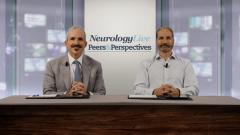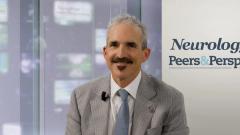
Improving Cognitive Awareness of Patients and Caregivers in MS Care
The neurologists discuss strategies to improve the cognitive health of patients with multiple sclerosis through physical and mental health multidisciplinary care.
Episodes in this series

Bruce Hughes, MD: Switching a little bit on this, I think it’s also incumbent upon us to not just talk about disease-modifying therapy and cognitive functioning, but we do know that physicality and physical exercise ties into mental health [treatment]. If the patient’s mental health is out of order, their physical health is never going to be maximally in order, so treating the whole patient is important. And then identifying what you’re talking about, because I think we focus more here on cognition, but kind of tying in with that is fatigue, which is so hard to identify. Educating patients on cognitive tips is very important as far as not just your disease-modifying therapy, but things that you that help minimize the effects of the cognitive decline on your health.
Robert Naismith, MD: I agree. I think your mental health plays a huge role in the disease. We see this all the time when people are under stress, when people aren’t able to take care of themselves, they present with worsening. That’s something you really need to dig into and assess, and we see that all the time where people are trying to juggle parents who are not doing well and who are sick, and that’s putting stress on the family or family dynamics between the spouse and is not the best, and this affects the disease. So I think what you brought up with exercise is an important thing that we talk about at every visit. Doing physical therapy as a tool to show you how to do stuff for yourself at home and then doing another visit to make modifications based upon the things that you’ve achieved with those exercises and really stressing [that] this is something that’s going to help you do better, addressing mood. People have a lot of depression [and] anxiety, [and] sleep is an issue for a lot of people. This impacts how they feel and how the disease manifests itself in the fatigue, so we use a lot of antidepressants in practice. But not everybody feels like that’s going to be the best thing for them, so we also have options for counseling. We have a list of counselors. One of the nice things is [that] people are now able to do counseling by [video chat], so they don’t necessarily have to go to a place to do it, so a lot of my patients choose to pick a counselor in their area. They might do some in-person visits, they might do some [telehealth] visits, so I think the access is very good for that. But thinking about the whole patient in terms of their mood, their sleep, their comorbidities, exercise program, how they’re interacting with everybody, and if there’s anything within your power to help that or get them to the professional that can help them do it together with you, those are the things that I’m looking for my practice. As a multidisciplinary MS [multiple sclerosis] center I want to have the tools to say, well, this isn’t my expertise, but I know someone who can help you with this; we need help to treat you in every way we can.
Bruce Hughes, MD: I think that’s spot-on. The referral to mental health providers is big in multiple sclerosis management because unlike many patients, MS patients tend to have very good insight into their disease process, and to me, those are the ones who do the best with cognitive therapy and counseling. At your center, do you find much benefit in referrals to speech language cognitive therapy for ongoing assessment like what you would do with physical therapy or occupational therapy, or have you not found that quite as helpful?
Robert Naismith, MD: I think it depends upon the person, but we do make the recommendation when we have the referral for neurocognitive testing, that’s going to be like a 2 or 2.5-hour battery where they can go through all the different domains of executive functioning, word finding, short-term memory, reading. They’ll go through all the different domains, and they’ll check their baseline level so they’re able to get a real sense of their cognitive function, and also their mood. They also check for mood disorders as well. And then we’ll have the specialist who does the testing explain everything to the patient and document and make a report. And then we’ll also make a referral to speech cognitive therapy so that they can use those results and gain more insight and come up with strategies to adapt to them. It may also include a referral to vocational rehab if it’s going to affect their work issues and if the combinations need to be made so that they’re able to perform at their best. So it depends on the person, but we always offer with that neurocognitive referral a chance to see a speech cognitive therapist and also, if they are working, vocational rehab to try to make the accommodations that are going to help them be successful in the work setting.
Bruce Hughes, MD: I think that point is very good in that sometimes we’re identifying [whether it is] brain volume loss in the disease process or are there confounding variables on their cognitive functioning such as depression, such as sleep disturbance, which I think is huge and really underrecognized in the multiple sclerosis population. We should be doing a lot more assessment of sleep for whatever the cause of why they’re having sleep disturbance. It’s just remarkably common. How do we how do we address and improve that?
Transcript is AI-generated and edited for clarity and readability.
Newsletter
Keep your finger on the pulse of neurology—subscribe to NeurologyLive for expert interviews, new data, and breakthrough treatment updates.













